Per recent trends, young worshippers have been offering KFC buckets to Fuhu Temple’s (伏虎宮) Tiger Lord. Whether they know it or not, this tiger won’t be devouring any of it, as he is vegetarian.
Temple director Hsu Ping-tsung (許炳宗) says that’s because the feline god in his place of worship — one of just a handful in Taiwan with the Tiger Lord as a principal deity — is of Buddhist origins. Before its deification, it was the mount of one of the 18 Arhats.
“The Tiger Lord told me that his generals and soldiers still need to eat meat in order to have the strength to carry out his deeds,” Hsu says. “So you can’t tell the believers to stop bringing meat.”
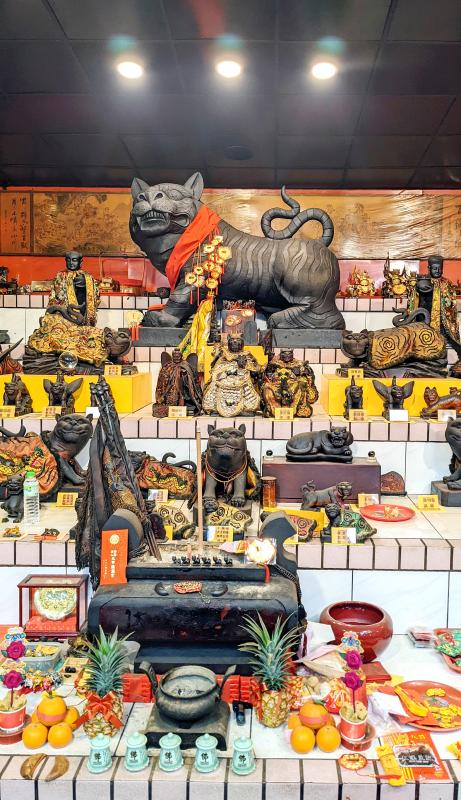
Photo: Han Cheung, Taipei Times
What about eggs, which have traditionally been the go-to offering for Tiger Lords?
“With all this talk of ovo-lacto-vegetarianism and the sort, I became confused too,” Hsu says. “I asked the Tiger Lord, but he didn’t answer me. But one thing he insists on is having enough water,” pointing to the red urn of water at the altar.
Although belief in the Tiger Lord has existed in Taiwan for centuries, its appeal among young people has grown in recent years as it has appeared in all sorts of popular media, most notably the hit 2017 film The Tag-Along 2 (紅衣小女孩2). And with it being the Year of the Tiger, Fuhu Temple, located on a remote hill in New Taipei City’s Shihding District (石碇), has been flooded with worshippers since the days running up to the Lunar New Year holiday.
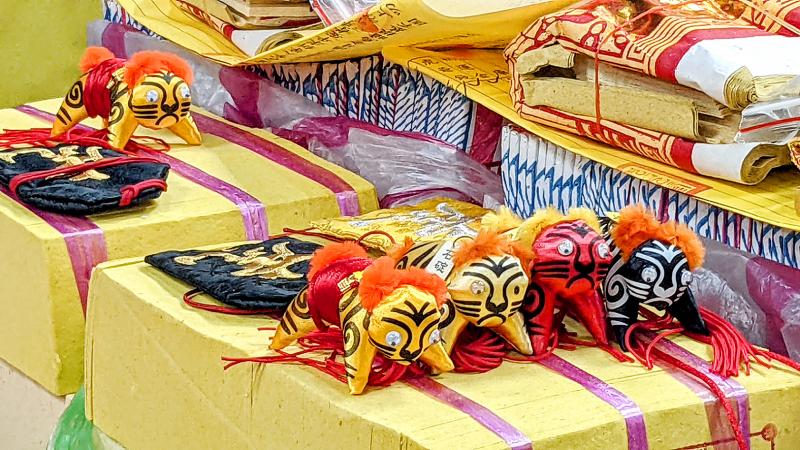
Photo: Han Cheung, Taipei Times
Hsu says it was crowded in the previous Year of the Tiger 12 years ago too.
“In other temples, it might be like this during occasions like the birthday of the main deity, whether it be Matsu or San Taizi,” he says. “But we have an entire Year of the Tiger.”
FIVE COLORS
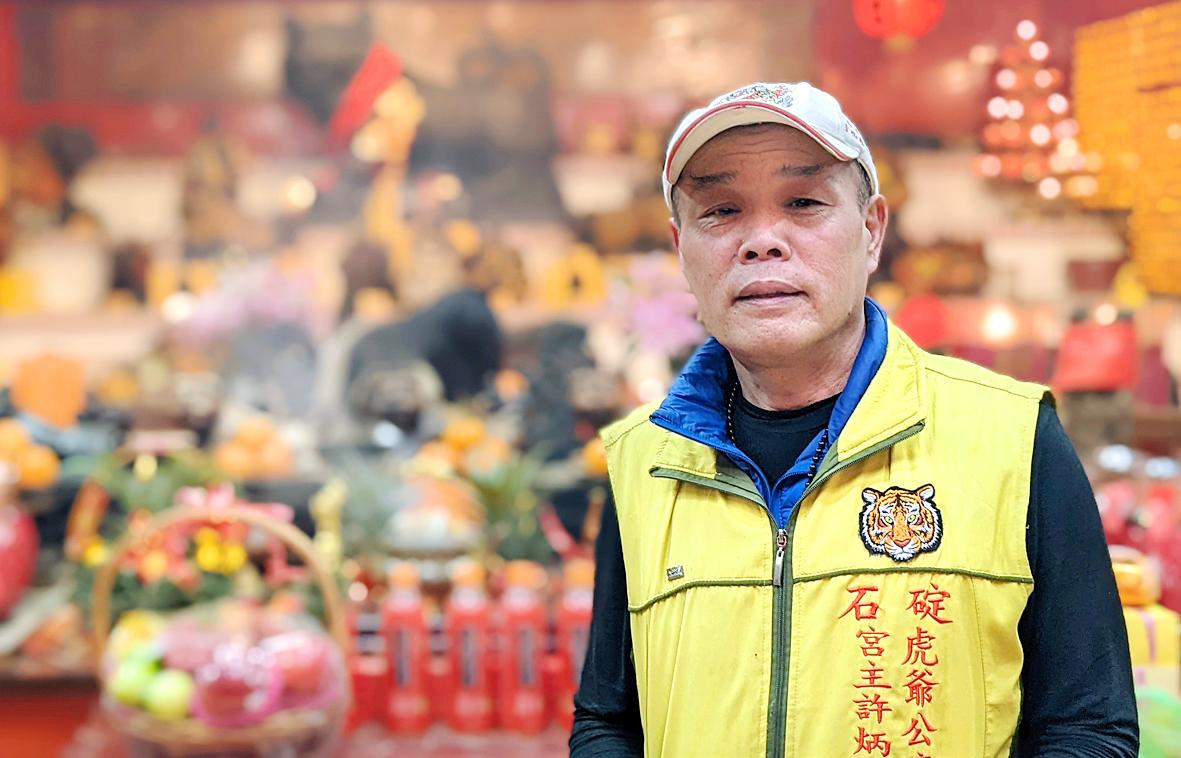
Photo: Han Cheung, Taipei Times
Most people come here to pray for money, and Hsu says that the temple is popular with bankers, real estate agents, moneylenders and salespeople. Most Tiger Lords in Taiwan are “Earth Tigers,” which lie under the altar of other deities, he says, and there are very few “Heavenly Tigers” in Taiwan that get their own high seats.
Heavenly Tigers are able to draw from the treasury of the heavens and reward people with money according to the good karma they accrue in life by doing good deeds, Hsu says, and they’re especially effective during the Year of the Tiger.
Each stack of spirit money is accompanied by one or many tiny stuffed tigers containing the Tiger Lord’s incense ash, most of them yellow. Hsu explains that each year, the Tiger Lord picks a color representing the Five Elements — this year happens to be yellow, which represents wealth.
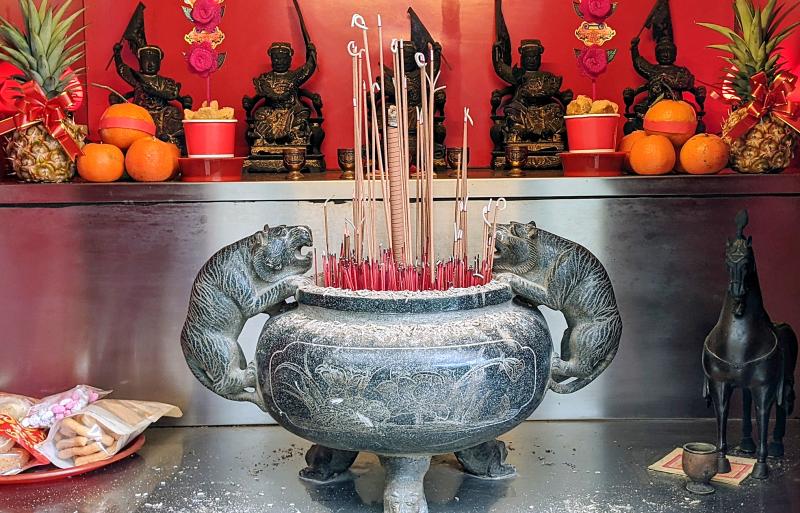
Photo: Han Cheung, Taipei Times
The Tiger Lord has forbidden Hsu to sell the stuffed tigers — even though he believes that the cute, handmade mascots are highly marketable — and people can only obtain them through buying spirit money to pray. The different colored ones on the table are from previous years, as many regular worshippers like to bring them back and pass them through the incense smoke to rejuvenate their power.
Hsu says manufacturers press him each year to reveal the color as early as possible, but he can’t until he “hears” from the Tiger Lord.
“It’s not a voice,” he says. “You just feel it.”
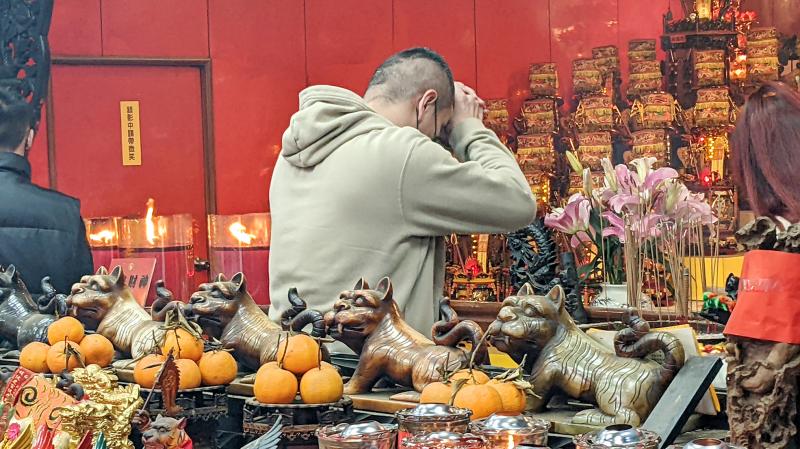
Photo: Han Cheung, Taipei Times
Hsu believes that each year’s color will predict that year’s events, so he’s positive that this year will be one of great prosperity. Last year’s color was black, which means gathering positivity. Hsu says with the outbreak, it made sense to lay low and build up one’s strength, and this year will be time to thrive.
In 2020, the color was white, which represented change and opportunity. Hsu interprets that as how the COVID-19 pandemic forced many businesses to reinvent the way they operate to survive.
FINDING ITS WAY
Hsu can still remember the exact moment three decades ago when the Tiger Lord successfully pushed its way out of Taipei’s Dizang Temple (地藏庵). This Tiger Lord was originally worshiped on its own, but its fierceness caused much unrest and violence in the area, and a monk suggested that it needed a human-based god to keep it under control.
“In the city, the tiger attacks everyone,” Hsu says. “The mountain is their natural territory where they can tell good people from bad people.”
Hsu’s elder brother was the Tiger Lord’s spirit medium then, and one day the deity expressed its wish to strike out on its own — with the approval of the Jade Emperor, the Taoist pantheon’s supreme deity. The temple’s directors agreed, and prepared to carve a new Tiger Lord statue and provide funds for its new temple.
But the Tiger Lord refused the offer, as he wanted the original statue to leave with him. The directors suspected Hsu’s brother of making this up, and finally agreed to leave the matter up to divination blocks. If they received 36 casts that landed on “yes” in a row, they would let the Tiger Lord go.
“I was there, and with each casting, my heart leaped,” Hsu says. Nobody could believe it as the 36th throw spun around and landed in the Tiger Lord’s favor.
“The spirit medium immediately carried the statue out of the temple.”
The Tiger Lord also turned down money offered by the temple, Hsu says, taking only the plaque that hangs over the main altar today.
“The highway wasn’t built yet and there was nothing here back then, just jungle,” Hsu says.
The brothers started looking into who owned the land and, as luck would have it, it belonged to Hsu’s grandfather.
The Tiger Lord told the Hsu family that when the highway reached Shihding, he would slowly be able to unleash his powers. Freeway No. 5 was completed in 2000, and worshippers gradually began to flock to the temple.
However, Hsu says after his brother died in 2007 and he took over, the mostly-elderly worshippers suddenly stopped coming. But the Tiger Lord asked him to be patient, that he would eventually bring a new wave of believers to the temple.
The turning point came in 2010, the last time the Year of the Tiger rolled around.
“He told me that I mustn’t feel defeated or obligated to make any changes. If I just waited here and served him well, then fate would bring people in.”

This is the year that the demographic crisis will begin to impact people’s lives. This will create pressures on treatment and hiring of foreigners. Regardless of whatever technological breakthroughs happen, the real value will come from digesting and productively applying existing technologies in new and creative ways. INTRODUCING BASIC SERVICES BREAKDOWNS At some point soon, we will begin to witness a breakdown in basic services. Initially, it will be limited and sporadic, but the frequency and newsworthiness of the incidents will only continue to accelerate dramatically in the coming years. Here in central Taiwan, many basic services are severely understaffed, and

Jan. 5 to Jan. 11 Of the more than 3,000km of sugar railway that once criss-crossed central and southern Taiwan, just 16.1km remain in operation today. By the time Dafydd Fell began photographing the network in earnest in 1994, it was already well past its heyday. The system had been significantly cut back, leaving behind abandoned stations, rusting rolling stock and crumbling facilities. This reduction continued during the five years of his documentation, adding urgency to his task. As passenger services had already ceased by then, Fell had to wait for the sugarcane harvest season each year, which typically ran from

It is a soulful folk song, filled with feeling and history: A love-stricken young man tells God about his hopes and dreams of happiness. Generations of Uighurs, the Turkic ethnic minority in China’s Xinjiang region, have played it at parties and weddings. But today, if they download it, play it or share it online, they risk ending up in prison. Besh pede, a popular Uighur folk ballad, is among dozens of Uighur-language songs that have been deemed “problematic” by Xinjiang authorities, according to a recording of a meeting held by police and other local officials in the historic city of Kashgar in

The People’s Republic of China (PRC) was out in force in the Taiwan Strait this week, threatening Taiwan with live-fire exercises, aircraft incursions and tedious claims to ownership. The reaction to the PRC’s blockade and decapitation strike exercises offer numerous lessons, if only we are willing to be taught. Reading the commentary on PRC behavior is like reading Bible interpretation across a range of Christian denominations: the text is recast to mean what the interpreter wants it to mean. Many PRC believers contended that the drills, obviously scheduled in advance, were aimed at the recent arms offer to Taiwan by the